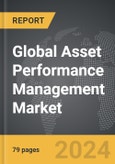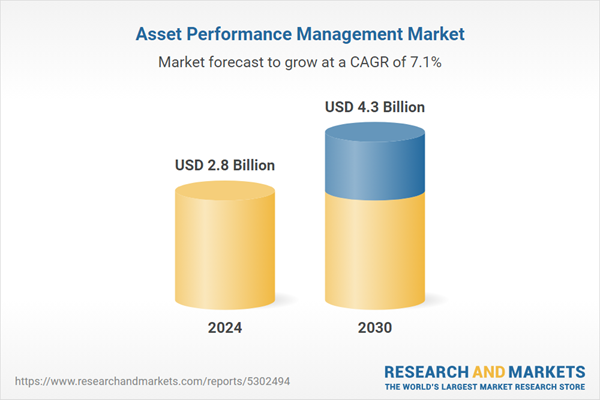Global Asset Performance Management Market - Key Trends and Drivers Summarized
Is Asset Performance Management the Key to Maximizing Operational Efficiency?
Asset Performance Management (APM) has become an essential framework for industries looking to optimize asset performance, reliability, and efficiency. APM encompasses a suite of tools, strategies, and methodologies aimed at monitoring, analyzing, and enhancing the functioning of physical assets such as machinery, equipment, and infrastructure. For asset-intensive sectors like manufacturing, energy, oil and gas, and transportation, where high-value assets are central to operations, APM ensures that assets remain in peak condition, minimizing costly unplanned downtime and prolonging asset lifespan. Traditional maintenance practices, often centered on scheduled checks and repairs, are gradually being phased out in favor of data-driven APM methodologies that emphasize predictive and prescriptive maintenance. This shift allows organizations to proactively address potential issues before they escalate, avoiding expensive repairs and maximizing operational uptime. By leveraging APM, companies can strategically manage asset performance in alignment with operational objectives, ensuring that assets contribute to productivity and profitability while meeting stringent safety and regulatory standards. This proactive approach is redefining how industries manage high-value assets, transforming APM into a critical pillar for operational success and efficiency.How Are Advanced Technologies Transforming Asset Performance Management?
Advancements in digital technology are revolutionizing Asset Performance Management, elevating it to a highly precise and insight-driven approach that goes beyond conventional asset maintenance. The integration of IoT, artificial intelligence (AI), and big data analytics has allowed APM to transition into a predictive and prescriptive model, enabling real-time, data-backed decision-making. IoT sensors installed in machinery and equipment continuously monitor critical parameters such as temperature, vibration, pressure, and energy consumption, providing a constant stream of data on asset health. With AI and machine learning algorithms analyzing this data, companies can identify patterns, predict potential failures, and recommend optimal maintenance actions to avoid costly breakdowns. The use of digital twin technology has also become a powerful asset within APM; by creating a virtual replica of an asset, companies can simulate different operating conditions, assess potential risks, and develop precise maintenance strategies. This virtual modeling allows for thorough testing and troubleshooting without disrupting real-world operations. Additionally, cloud computing has streamlined data accessibility, allowing teams to access performance data and collaborate from any location, significantly enhancing responsiveness and decision-making. These innovations have transformed APM from a reactive system to a forward-looking, data-driven strategy, allowing companies to increase operational efficiency, reduce costs, and maximize the value of their assets.Why Is Asset Performance Management Becoming a Strategic Priority for Organizations?
Asset Performance Management is increasingly being recognized as a strategic priority by organizations, especially in asset-intensive industries, due to its ability to enhance operational efficiency, manage risks, and improve overall business performance. Through APM, companies can align asset performance with broader organizational goals, using data-driven insights to make informed decisions that boost both productivity and profitability. In industries where asset reliability and availability are crucial to maintaining production schedules - such as in energy and manufacturing - APM plays a significant role in reducing unplanned downtime, one of the most disruptive and costly issues faced by industrial operations. This focus on asset optimization also helps organizations achieve regulatory compliance by enabling continuous, real-time monitoring to meet safety, environmental, and operational standards. Additionally, APM aligns closely with Environmental, Social, and Governance (ESG) goals, as it promotes sustainable asset usage and minimizes waste, reducing the environmental footprint associated with asset failure or frequent replacements. For investors and stakeholders, asset performance metrics like Return on Assets (ROA) have become key indicators of a company's operational health, making APM an important factor in financial evaluations. By focusing on performance, risk management, and sustainability, APM is emerging as a central component in strategic asset management and corporate responsibility, particularly as companies seek to demonstrate a commitment to efficient, reliable, and sustainable operations.What Factors Are Driving the Growth of the Asset Performance Management Market?
The growth in the Asset Performance Management market is driven by several converging factors, including rapid technological advancements, increased regulatory scrutiny, and shifting industry priorities toward sustainability and efficiency. As industries adopt digitalization strategies, APM systems are gaining traction for their ability to leverage IoT, AI, and big data analytics to gather and interpret asset performance data at an unprecedented scale. This data-driven approach supports predictive and prescriptive maintenance models that not only maximize asset uptime but also reduce operational costs, as companies can identify potential issues early and make more informed maintenance decisions. The growing importance of compliance with regulatory standards, especially in high-risk sectors like oil and gas, utilities, and transportation, is further propelling APM adoption. With real-time monitoring and detailed reporting capabilities, APM solutions help companies ensure adherence to safety, environmental, and operational regulations, reducing the risk of penalties and operational disruptions. Additionally, the rise of ESG initiatives is shaping corporate investment in APM, as organizations seek to optimize asset use and minimize environmental impact, aligning with stakeholder expectations for responsible operations. The aging infrastructure in industries like power generation, manufacturing, and mining is also spurring demand for APM solutions, as companies look for cost-effective ways to extend the lifespan of critical assets. These factors, combined with a strong emphasis on risk management, operational efficiency, and sustainable growth, are driving the APM market forward, making it an indispensable tool for companies focused on achieving long-term resilience and performance.Report Scope
The report analyzes the Asset Performance Management market, presented in terms of market value (US$ Thousand). The analysis covers the key segments and geographic regions outlined below.- Segments: Component (Solutions, Services); Deployment (Cloud, On-Premise); Vertical (Energy & Utilities, Manufacturing, Chemicals, Government & Defense, Healthcare & Pharmaceuticals, Other Verticals).
- Geographic Regions/Countries:World; United States; Canada; Japan; China; Europe (France; Germany; Italy; United Kingdom; Spain; Russia; and Rest of Europe); Asia-Pacific (Australia; India; South Korea; and Rest of Asia-Pacific); Latin America (Argentina; Brazil; Mexico; and Rest of Latin America); Middle East (Iran; Israel; Saudi Arabia; United Arab Emirates; and Rest of Middle East); and Africa.
Key Insights:
- Market Growth: Understand the significant growth trajectory of the Asset Performance Management Solutions segment, which is expected to reach US$3.1 Billion by 2030 with a CAGR of a 6.6%. The Asset Performance Management Services segment is also set to grow at 8.7% CAGR over the analysis period.
- Regional Analysis: Gain insights into the U.S. market, valued at $749.7 Million in 2024, and China, forecasted to grow at an impressive 11.3% CAGR to reach $986.7 Million by 2030. Discover growth trends in other key regions, including Japan, Canada, Germany, and the Asia-Pacific.
Why You Should Buy This Report:
- Detailed Market Analysis: Access a thorough analysis of the Global Asset Performance Management Market, covering all major geographic regions and market segments.
- Competitive Insights: Get an overview of the competitive landscape, including the market presence of major players across different geographies.
- Future Trends and Drivers: Understand the key trends and drivers shaping the future of the Global Asset Performance Management Market.
- Actionable Insights: Benefit from actionable insights that can help you identify new revenue opportunities and make strategic business decisions.
Key Questions Answered:
- How is the Global Asset Performance Management Market expected to evolve by 2030?
- What are the main drivers and restraints affecting the market?
- Which market segments will grow the most over the forecast period?
- How will market shares for different regions and segments change by 2030?
- Who are the leading players in the market, and what are their prospects?
Report Features:
- Comprehensive Market Data: Independent analysis of annual sales and market forecasts in US$ Million from 2024 to 2030.
- In-Depth Regional Analysis: Detailed insights into key markets, including the U.S., China, Japan, Canada, Europe, Asia-Pacific, Latin America, Middle East, and Africa.
- Company Profiles: Coverage of players such as ABB, Accruent, Aptean, Arms Reliability, Aspentech and more.
- Complimentary Updates: Receive free report updates for one year to keep you informed of the latest market developments.
Some of the 14 companies featured in this Asset Performance Management market report include:
- ABB
- Accruent
- Aptean
- Arms Reliability
- Aspentech
- Aveva
- Bentley Systems
- DNV GL
- Emaint
- GE Digital
This edition integrates the latest global trade and economic shifts into comprehensive market analysis. Key updates include:
- Tariff and Trade Impact: Insights into global tariff negotiations across 180+ countries, with analysis of supply chain turbulence, sourcing disruptions, and geographic realignment. Special focus on 2025 as a pivotal year for trade tensions, including updated perspectives on the Trump-era tariffs.
- Adjusted Forecasts and Analytics: Revised global and regional market forecasts through 2030, incorporating tariff effects, economic uncertainty, and structural changes in globalization. Includes historical analysis from 2015 to 2023.
- Strategic Market Dynamics: Evaluation of revised market prospects, regional outlooks, and key economic indicators such as population and urbanization trends.
- Innovation & Technology Trends: Latest developments in product and process innovation, emerging technologies, and key industry drivers shaping the competitive landscape.
- Competitive Intelligence: Updated global market share estimates for 2025, competitive positioning of major players (Strong/Active/Niche/Trivial), and refined focus on leading global brands and core players.
- Expert Insight & Commentary: Strategic analysis from economists, trade experts, and domain specialists to contextualize market shifts and identify emerging opportunities.
Table of Contents
Companies Mentioned (Partial List)
A selection of companies mentioned in this report includes, but is not limited to:
- ABB
- Accruent
- Aptean
- Arms Reliability
- Aspentech
- Aveva
- Bentley Systems
- DNV GL
- Emaint
- GE Digital
Table Information
| Report Attribute | Details |
|---|---|
| No. of Pages | 350 |
| Published | January 2026 |
| Forecast Period | 2024 - 2030 |
| Estimated Market Value ( USD | $ 2.8 Billion |
| Forecasted Market Value ( USD | $ 4.3 Billion |
| Compound Annual Growth Rate | 7.1% |
| Regions Covered | Global |









